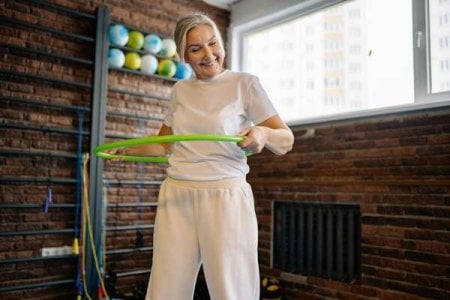Discover how seniors are spinning their way to amazing health with this simple toy!
By
Danielle F.
- Replies 0
Remember the carefree days of childhood, when a simple hula hoop could provide endless entertainment? Well, it turns out that this nostalgic toy is making a comeback, but not just as a source of fun. Seniors across Australia are rediscovering the hula hoop, not only as a blast from the past but as a fantastic way to maintain fitness and good health.
At the Seniors Discount Club, we're always on the lookout for enjoyable and effective ways to stay active, and hula hooping is a trend we can't ignore. It's not just child's play; it's a legitimate form of exercise that can have a profound impact on your physical and mental well-being.
Why Hula Hooping Is Ideal for Seniors
Hula hooping is a low-impact, high-reward activity that can be tailored to suit the fitness levels of seniors. It's a fun way to work out that doesn't feel like a chore.

Here's why you should consider adding a hula hoop to your fitness routine:
1. Improves balance and coordination: As we age, maintaining balance becomes crucial to prevent falls. Hula hooping requires you to engage your core and shift your weight, which can help improve your proprioception – the body's ability to sense its position in space.
2. Strengthens core muscles: The repetitive motion of hula hooping targets the stabilising muscles in your core, hips, and legs. Strengthening these areas is essential for good posture, spinal alignment, and stability.
3. Boosts cardiovascular health: Even a short session can get your heart pumping, improve circulation, and help burn calories. It's a form of moderate-intensity cardio that's gentle on the body but effective for maintaining heart health.
4. Enhances motor skills: The rhythmic movement of the hoop requires coordination between your upper and lower body, which can help keep you agile and mobile in your daily activities.
5. Promotes joint health: The rotational movements are gentle on the hips and spine, promoting flexibility and reducing stiffness without adding stress to the joints.
6. Mood elevation: Hula hooping can release endorphins, the body's natural feel-good chemicals, which can improve mood, reduce stress, and combat anxiety.
7. Strengthens bones: The slight pressure applied during hula hooping can help in maintaining bone density, reducing the risk of osteoporosis – a common concern among seniors.
Getting Started with Hula Hooping
Before you start, it's important to choose the right hula hoop. Larger hoops (38 to 42 inches in diameter) are ideal for seniors because they rotate more slowly and are easier to control. Foam-padded hoops are also recommended to minimise the risk of bruising.
Here are some tips for incorporating hula hooping into your routine:
While hula hooping is a fantastic exercise for many seniors, it may not be suitable for everyone. If you have severe balance issues, joint problems, or other health concerns, it's best to seek advice from a medical professional.
Incorporating hula hooping into your fitness routine can be a delightful way to work on your health goals. It's a reminder that staying active doesn't have to be dull – it can be as joyful as a childhood game. So why not give it a whirl? You might just find yourself spinning your way to a healthier, happier you.

We'd love to hear from our readers! Have you tried hula hooping for exercise? What was your experience like? Share your stories in the comments below, and let's inspire each other to keep moving and stay healthy.
At the Seniors Discount Club, we're always on the lookout for enjoyable and effective ways to stay active, and hula hooping is a trend we can't ignore. It's not just child's play; it's a legitimate form of exercise that can have a profound impact on your physical and mental well-being.
Why Hula Hooping Is Ideal for Seniors
Hula hooping is a low-impact, high-reward activity that can be tailored to suit the fitness levels of seniors. It's a fun way to work out that doesn't feel like a chore.

Hula hooping does not require any strenuous training, making it a great workout for Aussies over 60. Image Credit: Pexels/Yan Krukau
Here's why you should consider adding a hula hoop to your fitness routine:
1. Improves balance and coordination: As we age, maintaining balance becomes crucial to prevent falls. Hula hooping requires you to engage your core and shift your weight, which can help improve your proprioception – the body's ability to sense its position in space.
2. Strengthens core muscles: The repetitive motion of hula hooping targets the stabilising muscles in your core, hips, and legs. Strengthening these areas is essential for good posture, spinal alignment, and stability.
3. Boosts cardiovascular health: Even a short session can get your heart pumping, improve circulation, and help burn calories. It's a form of moderate-intensity cardio that's gentle on the body but effective for maintaining heart health.
4. Enhances motor skills: The rhythmic movement of the hoop requires coordination between your upper and lower body, which can help keep you agile and mobile in your daily activities.
5. Promotes joint health: The rotational movements are gentle on the hips and spine, promoting flexibility and reducing stiffness without adding stress to the joints.
6. Mood elevation: Hula hooping can release endorphins, the body's natural feel-good chemicals, which can improve mood, reduce stress, and combat anxiety.
7. Strengthens bones: The slight pressure applied during hula hooping can help in maintaining bone density, reducing the risk of osteoporosis – a common concern among seniors.
Getting Started with Hula Hooping
Before you start, it's important to choose the right hula hoop. Larger hoops (38 to 42 inches in diameter) are ideal for seniors because they rotate more slowly and are easier to control. Foam-padded hoops are also recommended to minimise the risk of bruising.
Here are some tips for incorporating hula hooping into your routine:
- Warm up: Always start with a warm-up to loosen your muscles and prevent injuries.
- Start slow: Begin with 10–15 minutes a day and gradually increase to 20–30 minutes, three to five times a week.
- Consistency is key: Regular hula hooping is key to seeing benefits without overexerting yourself.
- Listen to our body: If you have any pre-existing conditions or concerns, consult with a healthcare provider before starting a new exercise regimen.
While hula hooping is a fantastic exercise for many seniors, it may not be suitable for everyone. If you have severe balance issues, joint problems, or other health concerns, it's best to seek advice from a medical professional.
Incorporating hula hooping into your fitness routine can be a delightful way to work on your health goals. It's a reminder that staying active doesn't have to be dull – it can be as joyful as a childhood game. So why not give it a whirl? You might just find yourself spinning your way to a healthier, happier you.
Key Takeaways
- Hula hooping is promoted as a fun and low-impact form of exercise suitable for seniors, offering benefits such as improved balance, coordination, and cardiovascular fitness.
- Regular hula hooping can strengthen core and leg muscles, enhance posture, and may even contribute to better bone health and reduced risk of osteoporosis.
- It is recommended that seniors choose larger, foam-padded hula hoops for ease of use and to reduce the risk of injury, starting with sessions of 10-15 minutes and building up to longer sessions over time.
- While beneficial for most elderly people, those with specific health concerns should consult a healthcare provider before taking up hula hooping as an exercise to avoid potential risks.







